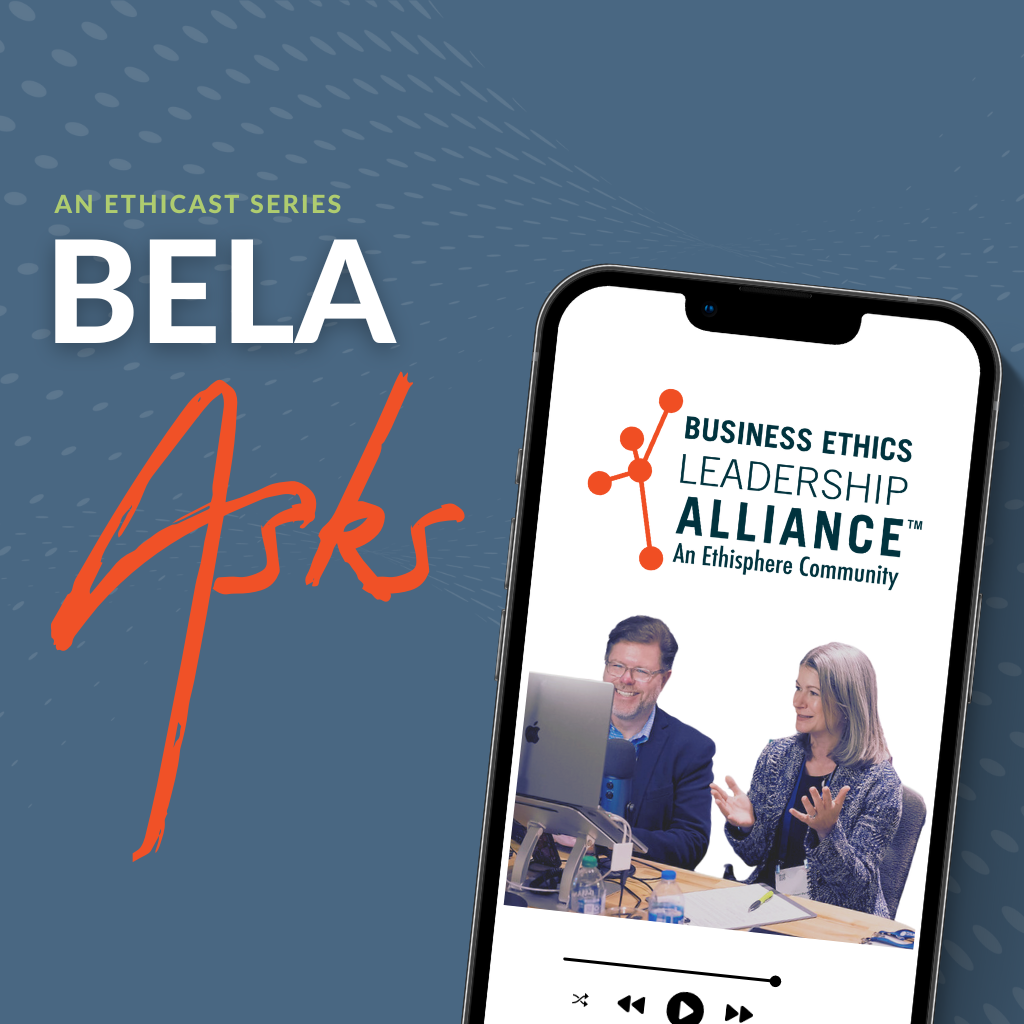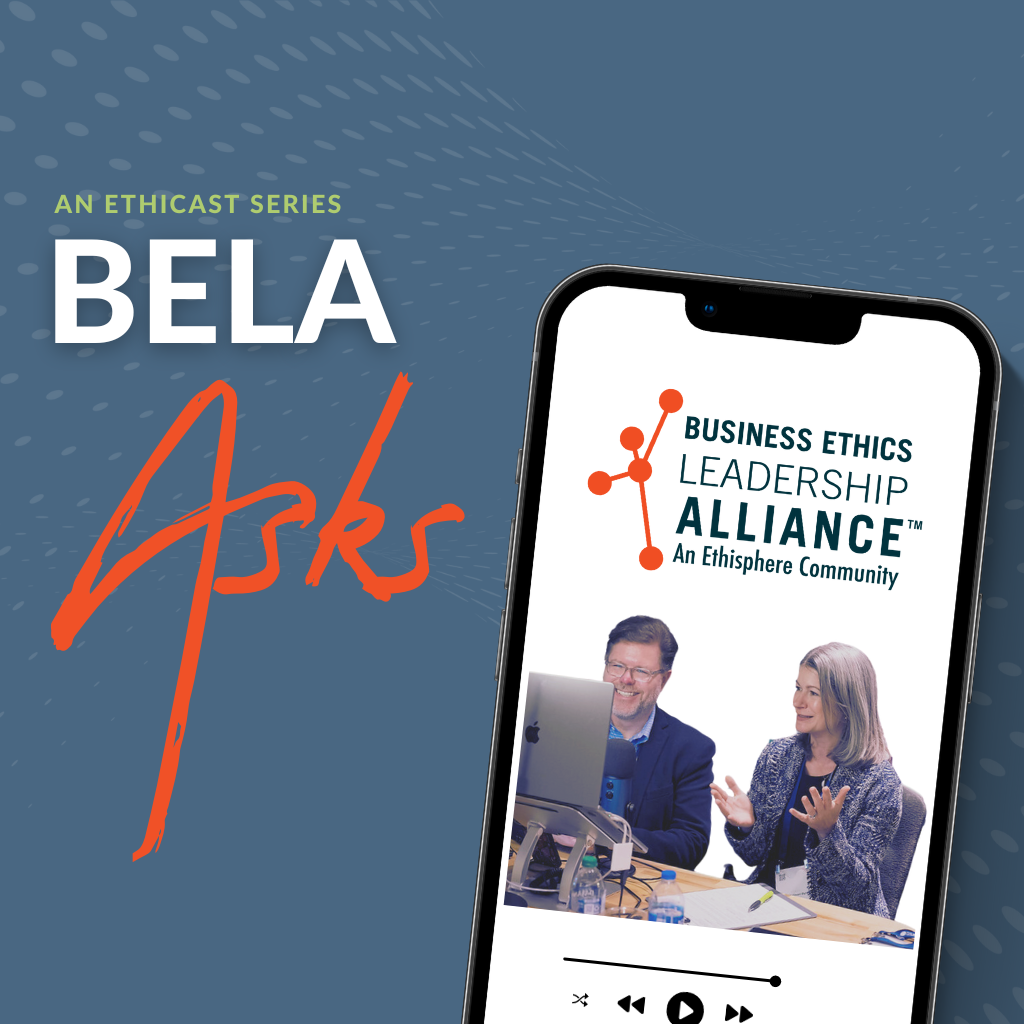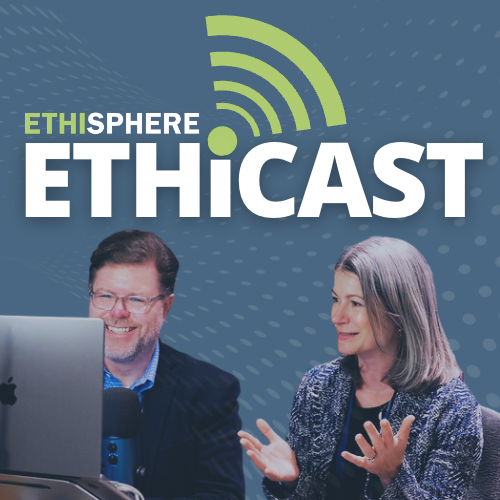[00:00:00] Speaker A: Hi everyone. Today we'll discuss how you can unlock your ethics and compliance program's behavior modification potential. I'm your host, Bill Coffin, and this is the Ethicast.
At this year's Global Ethics Summit, one of our panelists remarked that in any given company you'll have 10% of employees who will always do the right thing, 10% who will always do the wrong thing, and the 80% in the middle that you're trying to influence. This makes behavior modification crucial to the success of any ethics compliance program, especially when it comes to how we use data analytics and employee engagement as tools for building a culture of integrity.
With us today to talk about this is behavior modification specialist, Jackie Pruitt. A noted change management specialist, legal expert and communication strategist. Jackie helps organizations achieve measurable outcomes for behavioral modification goals by creating award winning content that is educational, impactful and engaging. Jackie, thank you so much for joining us.
[00:01:06] Speaker B: Thank you for having me.
[00:01:08] Speaker A: You have done an awful lot of work around data and key performance indicators as a way to drive algorithmic search content performance and communication reach. These are all things that folks in ethics and compliance talk about as end goals, but they don't often discuss them as part of their actual discipline. So how did you find your way into developing skills around these areas and how have they helped to drive your career in ethics and compliance?
[00:01:30] Speaker B: I've had a very non traditional background. I like to jokingly say that I'm Jackie of all trades because I've taken a very non traditional route to achieving non traditional results.
My background really started back a long time ago in change management for financial institutions doing mergers and acquisitions assimilation trainings. And in that role I really got a chance to understand how to help people, how to guide them, how to take people who were frankly very scared as a lot of change was coming at them at once. They didn't know if their jobs were going to still be there, if they'd be made redundant. And it was my job to help them understand how to achieve that. But what I would do for the company is they would parachute me in. I would look at what I called the four Ps, the policies, the procedures, the products and the people, and make my recommendations to the board. And then I'd have to roll those changes out to entire organizations, both the bank that was acquiring them as well as the bank that was being acquired.
And you have to learn how to help people see the way to the path of their greatest potential. And that's kind of what I've dedicated my whole career to Is helping people achieve and helping them achieve in the right way, which is kind of how it dovetails in with ethics and compliance. From there, my more formal training, if I had any, came from my work with the state.
I was a leadership and professional development trainer for the elite police forces of Texas at the Texas Department of Public Safety, or dps.
My students were the Texas Rangers, Criminal Investigation division, Homeland Security, as well as the top scientists, the ones who worked in the state crime lab. And these were the people who are excellent at what they do. They were already elite amongst other officers of the peace and criminal scientists, but now they wanted to go from being an individual contributor to a leader. And so I had to help them redesign their entire program. And that's really behavior modification is what we're talking about. How do you shift from the mindset of being an on the side of the road officer or a ranger who's going from district to district, to being a leader of other rangers, to being a leader of other scientists? I got to develop some amazing programs, and I was given amazing resources, Some of the best that the state had to offer, as well as partnering with outside organizations. I learned how to partner with places like the naacp, Anti Defamation League, Equal Rights Campaign to help develop this program.
And some of it was also about learning how to understand and correctly interpret regulatory requirements. Because you can't just teach officers of the law whatever you want. There's a very prescribed and very regulated process for that. And that even goes down to the name of what you could call your courses. So here I am being asked to teach a course called attitude. It's positively yours to rangers.
And if you think that's an easy sell, I promise you it's not the first time I taught this class. I literally had the minimum required amount of students sign up. It was eight students to be able to hold a class, and most of them were voluntold, as we called it, to be there.
And by the time I left, it was the most requested course, including police tactics.
And that goes to understanding those four P's that I talked about during my mergers and acquisitions. You have to understand your audience. You have to understand the regulatory requirements, you have to understand the policies, the processes, but most importantly, you have to understand the people that you're trying to reach. From there, I got recruited to the body that had been regulating my courses, which is called the T cold, the Texas Commission on Law Enforcement. And I was recruited to be the chief regulatory policy writer on the topic of law enforcement licensure. So I went from creating classes based on this statute to creating the statute itself. I learned a lot about how regulators think, how they have to approach things, what their requirements were. But I also learned it was like a masterclass in how to be apolitical in a hyper political environment. If you think people don't have opinions on how law enforcement should be governed, I beg to differ.
Any course I wrote, any statute I wrote had to go up for legal review as well as public review.
I had massive challenges to a lot of my work because again, of what the topic was that I was overseeing. At one point, I had to learn how to liaise with the national head of NAMI because they had concerns about a mental health component of one of the pieces of statute I was writing.
Another instance, I got to work with the governor's political appointees on the governor's task force for sexual assault. So you really have to learn how to separate out politics, be apolitical, and learn how to achieve what you need to in the end.
And all this ties back to ethics and minds because each of these things taught me a different set of skills that I think you really need to be able to affect change in organizations.
[00:06:46] Speaker A: So, Jackie, your expertise as a professional behavior modification specialist seems like a secret weapon when it comes to driving training completion rates, or just changing culture in general. What perspectives does this particular skill set of yours give you on how to drive ethics and compliance results that perhaps other folks in this area might miss?
[00:07:04] Speaker B: So behavior modification is ultimately about having measurable outcomes. Everything you're doing should have an impact on one side or the other. You should be able to see a shift in a behavior. Either it's something you want to see more of or less of. And if you're not able to track that, you're really not affecting change. You're just checking a box. And I like to break it down like this. A lot of people talk about KPIs, and KPIs are so important. A KPI is a key performance indicator, but it's really a metric that you should be using towards getting to what I call KQIs. And I feel like our industry is just starting to get used to this phrase. KQIS are key quality indicators. So a KPI is how many people took your training, how many people passed the test. A KQI is how many people accessed the policy that you were teaching them about. Did you have an increase in reports relating to the topic, to your hotline? Were other tools accessed? Were there an increase in reports? Was there a decrease in reports? How did the Behaviors change. Because you should never just be throwing a training or communication out there without looking to see something from it. I've been very passionate about looking at data, about looking at what the root cause analysis is of movement, of behaviors. And I think that directly ties to your outcomes. Because if you're starting from the place of why are people doing this? Why is it happening this way? What about our system is causing this outcome? Because sometimes the training isn't the answer. Sometimes it's how the policy is working, sometimes it's how the procedure is working, sometimes it's something to do with the culture. And a simple training or communication isn't going to automatically fix everything. I like to say this role is not the silver bullet to your organization. Like you can't just hire a Jackie and then all of a sudden, boom, it's going to be better. It has to be a system wide change. A strategist like me can help your company identify what the root cause is, ways of addressing these things, and if you position this role correctly, by having a report to say, the chief compliance officer. This role is kind of like the right hand of the chief compliance officer. A lot of people understand the chief compliance officer for investigations. That's your reactive side, that's your left hand. The right side is your behavioral modification or the proactive side.
[00:09:30] Speaker A: What is a piece of career advice that you would give to someone just getting into ethics and compliance now, given what you have learned and more importantly, how you have applied next generation data awareness and behavior modification skills to this space.
[00:09:44] Speaker B: So first and foremost, you have to have a tough skin. I like to say that this is change management. Ultimately this is behavior modification. And another word for change is growth. And they don't call it growing comfort, they call it growing pains. And sometimes it's going to be uncomfortable. They wouldn't need us if it was already perfect. Right? So what we exist to do is to come in and, and kind of like I said at the top of this, I started my career with mergers and acquisitions assimilations where people were very, very afraid of the change that was coming at them. And I view this role as very similar because again, when you're coming in, people are going to say, well, we want this and we want that and we want this beautiful culture.
It's kind of like going on a diet. Then you know, when you start a diet, people are like, oh, I want to lose all this weight. I could totally do this. And then all of a sudden, about two or three weeks in, people want to start cheating and it's not that they're trying to break the diet. It's not that they don't want those end goals. It's that it's hard to do. Change is hard to affect.
And I would like to say if you're going to do this role, you have to have a thick skin and you have to have the support of your management team because you can't go this alone. So if you're looking to get into this line of work and you're looking to try to do this line of work, you have to go into it understanding A you must be apolitical. You can't be there to tell people what they want to hear, but you have to know how to tell them what they need to hear.
I would also say that you really need to understand how to help people get past the fear of the hurt. Because change can hurt sometimes. And the other thing is you have to be aware that people are going to resist that change either consciously or unconsciously. And sometimes there's going to be big, big reactions to the change that you're trying to affect.
And finally, I would say that the three areas of skills that you really need to develop are you need to understand regulatory policy. You need to understand what a regulator is actually saying. I would challenge that. Lawyers are great at interpreting how to try to get around what lawyers are saying, whereas regulators are really good at trying to catch lawyers doing that.
I would say you have to have data analysis expertise, root cause analysis expertise, and I would say you have to have behavioral modification or change management expertise. And sometimes companies. I'm going to call this out. You're looking for a unicorn. Not everyone is like me and has a crazy, weird, non traditional background. I'm as weird as the city. I come from Austin, Texas. But not everyone is going to have all three of these things. Sometimes you're going to have to break them apart. I actually wrote an article about this on the three pronged approach to really making sure you're shoring up your ethics and compliance program. But to the individual who's interested in trying to take on a role like mine, or you know, the role that the Department of Justice Criminal Division just mandated, every company should have. So if you're coming out there looking for someone, find someone who's out there networking. Because there is no degree out there for this right now. It doesn't exist. There's no corporate behavior modification, legal expert, change management degree. It just doesn't exist. So what you're going to have to do is find your way of meeting the people who are in the industry who are already doing this. Share knowledge, help lift one another up. That's one of the great things I got out of getting to go and meet you Bill, at, you know, Ethospheres Global Ethics Summit. It was an amazing chance to meet people and while I have to say I love going to those individual breakouts and to the big panels and stuff like that, some of the best stuff you're going to learn is from meeting the other members and just getting out there and talking to each other.
[00:13:34] Speaker A: Well, Jackie, this has been a fantastic discussion. I'm so glad you're able to come to the show and share your insights with us. You have a wonderful story and it's been just terrific to hear you speak. Thank you so much for joining us.
[00:13:44] Speaker B: Thank you so much for having me. It's been a true joy.
[00:13:47] Speaker A: For a host of free reports, presentations, webinars and more on the topics of training, communications and employee engagement, visit the Ethisphere resource
[email protected] resources this show is all about showcasing excellence in action and the best thought leaders in the ethics and compliance community. If you'd like to appear as a guest on the Ethicast to share a best practice, a success story, or your own proof point around how business integrity builds value, we would love to hear from you. Please visit ethisphere.com ethicast to drop us a line. I'm Bill Coffin and this has been the Ethicast. For more episodes, please Visit the Ethosphere YouTube
[email protected] ethisphere and if this is your first time enjoying the show, please make sure to like and subscribe on YouTube, Apple Podcasts and Spotify. Thanks so much for joining us. And until next time, remember, strong ethics is good business.


